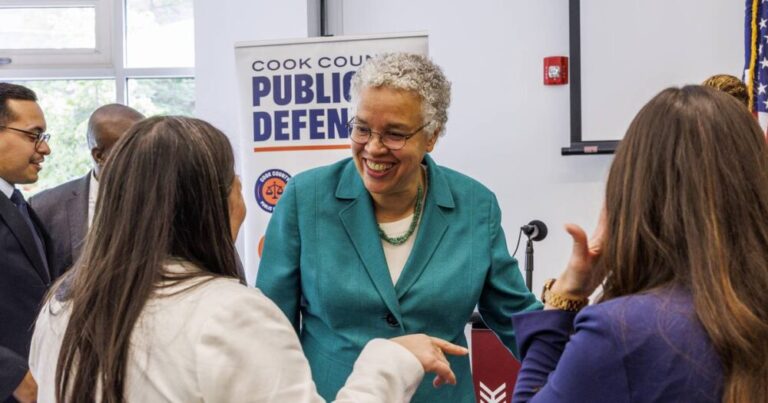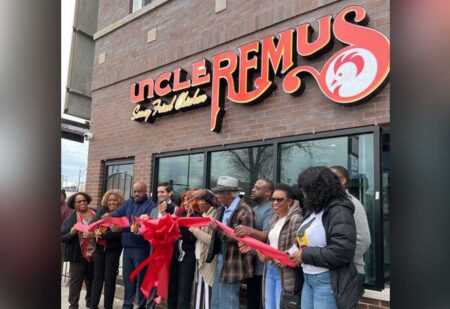Following years of consternation about whether Cook County’s two main pension funds would fulfill its obligations to its 39,000 employees and retirees, county leaders are saying they are on track to reform.
A pair of moves within the past year has freed up access to more pools of cash to help shore up the county’s long-underfunded pensions, though fiscal experts say the county will have to be careful not to overcorrect and tie their hands on spending for other needs.
The two funds for Cook County and Forest Preserve employees and retirees were the only ones in Illinois not required to put in enough money to pay out promised benefits to annuitants in future years, known as actuarial funding. But officials say legislation for county employees that is awaiting Gov. J.B. Pritzker’s signature and another bill for forest preserve employees that went into effect June 1 are providing a road map.
“This is a financially prudent step toward confronting our pension challenges,” Cook County Board President Toni Preckwinkle said in a release late last month. For several years, Preckwinkle tried and failed to codify a series of reforms for county pensions that included putting them on a path to full funding.
On paper, both funds were slated to deplete their assets in the coming decades. The forest preserve fund was slated to be drained by 2044 and the fund for county employees was scheduled to be depleted by 2055 because under the original statute the county was required to pay its pension funds an annual sum only based on a “multiplier” untethered to the funds’ long-term needs.
The legislation is a relief to the funds’ roughly 19,000 active members and 20,000 annuitants. And unlike the reforms instituted for Chicago’s pensions, they won’t necessitate a walloping property tax increase in the coming years. Money is already teed up to make additional payments for both funds.
Shoppers in Cook County have already been footing the fix for county employee pensions since 2015, when Preckwinkle successfully backed hiking the sales tax to prop up the pension fund. County voters also have approved raising property owners’ tax bills to help the forest preserve fund, a charge that will show up on second installment of 2023 bills.
But under the bill awaiting Pritzker’s signature, the county would be able to use any funding source for pension fund contributions, not just property tax revenues.
Blake Yocom, a senior director at the ratings agency S&P, told the Tribune in an email that the change represents a “milestone in Cook County’s efforts to stabilize its pension system over the long term,” but the required payments could tie the county’s hands in the future.
“While this is clearly positive news for pension funding discipline, it could reduce operational flexibility over time, particularly in an economic downturn,” he said. The county has an A+ rating from the agency, with a stable outlook.
Funding levels at the county funds were not as dire as dozens of others across Illinois. But state Sen. Rob Martwick of Chicago, who helped usher through both reforms this year, said the change gives county taxpayers “one less bit of insecurity to know there’s not going to be a big property tax shock because of some huge bill that comes due.”
“It is one more bit of security for a business community that, I think, one of the biggest problems they suffer from is that unknown — ‘What’s going to happen tomorrow? What sticker shock will there be when the bill is due?’” he said.
Watchdogs began publicly sounding the alarm about the county’s pension funding several years ago. A decade earlier, the fund had 90% of the cash on hand needed to cover payments it was obligated to make. By 2012, the Great Recession had clobbered investment returns and the county’s funding level dropped to 58%. That spurred a series of talks between county officials and union leaders about a possible solution.
In 2015, Preckwinkle proposed a fix that cut benefits and raised workers’ retirement age while boosting the county’s annual payments and guaranteeing health care benefits for retirees. It cleared the Illinois Senate, but not the House. Its fate seemed unclear, since that same month, the Illinois Supreme Court issued its landmark decision declaring pension benefits were a contractual agreement that could not be “diminished or impaired.”
Later that summer Preckwinkle changed tacks, pitching a penny-on-the-dollar sales tax hike with the extra revenues largely dedicated to addressing what Preckwinkle called the pension “tsunami.” The goal was to fully fund the pensions within 30 years. The county board, which had reversed a sales tax hike instituted under Preckwinkle’s predecessor Todd Stroger, narrowly approved the Preckwinkle-backed hike.
At the time, the combination of the county, state, city and public transit sales tax rates brought Chicago up to having the highest sales tax rate in the nation. It drew rebukes from some commissioners who said the tax was regressive and would drive businesses to the collar counties. The Civic Federation, the business-backed fiscal watchdog group, warned that “relying on a single, economically sensitive revenue source like the sales tax might prove problematic.”
Despite its concerns back then, the Civic Federation’s current acting president, Sarah Wetmore, said sales tax revenues have been strong, thanks to a growing economy and the ability to apply the tax to online purchases — including a boom in online shopping during the COVID-19 pandemic.
Between 2016 and 2022, the county has stayed true to its promise, making $2.3 billion in supplemental payments to the fund, pledging another $292 million this year, and setting aside tens of millions more for a pension reserve in case of an economic downturn.
Creating that reserve was “a good move,” Wetmore said, and will help the county withstand a potential drop in sales tax revenues or investment returns in times of recession.
Those supplemental payments boosted the county fund’s funded ratio — the ratio between available assets and liabilities — from 60% at the end of 2015 to 70% by the end of 2021.
“It’s hard to argue with the results here,” Wetmore said. “This is a fund that is on the upward trajectory.”
But those payments technically “usurped” state law, Martwick said. The existing statute only allowed the county to use property tax revenues to make pension payments. Each year, Preckwinkle and the Cook County Pension Fund would sign an intergovernmental agreement to authorize the sales tax transfer.
And while it helped boost funding, those year-by-year agreements made it difficult for the pension fund to pursue long-term strategies, including investing more in funds that could yield higher returns.
Critics also warned that the handshake agreements could be undone by a new county board president or a majority of restive commissioners who would rather unwind the sales tax hike or see the hundreds of millions spent on other programs or services.
“If that IGA (intergovernmental agreement) did not continue for whatever reason, our funded ratio would be significantly diminished to a sub-40% ratio,” interim CCPF executive director Brent Lewandowski told the Cook County Board last September. “Only with a statutory change of guaranteed contributions over time can we expect the sustainability of the fund.”
Preckwinkle tried and failed multiple times — in 2016, 2019 and 2022 — to codify those changes in the General Assembly. But her proposals included provisions to change the pension fund board’s governance structure to provide more seats to representatives of the county, giving Preckwinkle additional appointees. While Preckwinkle said the change would provide more investment experience on the board, the changes were met with resistance from organized labor and Treasurer Maria Pappas, who in 2019 described the proposals as “political,” “not substantive,” and damaging to the board’s independence.
Preckwinkle had also tried to institute a retiree health care trust fund. But toward the end of this year’s spring session, she dropped both the governance and health care proposals.
“In the end, pushback from employee unions and the members of the fund themselves” limited negotiations to actuarial funding and more modest fixes, Martwick said. More importantly, he said, the county will be required to pay enough in to fully fund future benefits, and in exchange, was given flexibility to come up with that revenue.
“It wasn’t real hard to compromise, because she was still memorializing the most important part: adequate funding,” Martwick said. “Those things, governance, health care got stripped away from this bill. I believe she’s going to continue to work on that in another way.”
The bill also makes a fix to ensure so-called “Tier Two” employee benefits keep pace with Social Security benefits. Tier Two — which applies to workers hired after Jan. 1, 2011 — gave less-generous benefits to retirees as a way of curbing the growth in pension liabilities. But warnings that benefits were so low they would not keep up with Social Security have increased, leading negotiations to begin statewide about potential fixes and hand-wringing about the cost to local governments. Cook County officials, though, estimated the Tier Two change would cost just $3 million annually, and included it in this year’s bill.
“We believe dealing with this issue now is the right thing to do and addresses a problem before it gets worse,” County Deputy CFO Dean Constantinou said in a release last month.
For the county fund, payments will be calculated to reach 100% funding by 2047. To ensure the fund can reach that goal while absorbing changes in demographics, benefits, or investment returns, the yearly payments will be calculated using “layered amortization.”
“A layered amortization is like a payment plan for something where total costs keeps changing,” county finance spokesman Ted Nelson said in an email. “The first year, you set up a payment plan based on the original cost, but then the next year the cost changes. So instead of setting up a brand-new payment plan you set up a payment plan for just the change in cost and layer that on top of the original payment plan.”
Pritzker signed the fix for the much smaller Forest Preserve pension fund — valued at roughly $230 million and with about 1,000 active and retired members — earlier this year. The changes put the fund on a path to 100% funding by 2054. Pritzker’s signature came just weeks after Cook County voters approved a referendum to raise the Forest Preserve District’s property tax levy, in part, to address their pension problems.
Though it was fully funded in 1999, the Forest Preserve pension’s funded ratio fell following the recession and has hovered around 60% for the past decade. That ratio was expected to fall starting in 2025, according to the fund’s latest actuarial report.
Despite those projections, attempts to hold a referendum before 2022 were deemed a political non-starter, thanks to decades of damaging headlines about Forest Preserves management. But after several years of reforms, the district was able to finally put the question to voters asking permission to raise its property tax levy in the November election. It passed overwhelmingly.
The increased levy — which is projected to add $20 a year to the average homeowner’s property tax bill, according to the district — will raise an additional $41 million.
Roughly $10 million of that will go toward pension contributions annually. The rest will be dedicated to ecological restoration, land acquisition, and maintenance costs, including for the Chicago Botanic Garden in Glencoe and Brookfield Zoo, which both stand on Forest Preserve District land.







